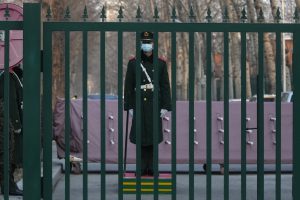While countries around the world warned their citizens to avoid traveling to Ukraine before the imminent military conflict, China did not take significant actions until the day Russia started its invasion. Instead, it downplayed the potential for conflict and thus missed the chance to safely evacuate Chinese citizens.
The information posted by the Chinese Embassy to Ukraine showed that the Chinese diplomatic mission changed its stance on the security crisis three times in less than a week. Initially recognizing the Russia-Ukraine war as a regional conflict, the Chinese embassy in Ukraine later encouraged Chinese citizens to put up Chinese flag stickers on their cars to help ensure their safety. But the embassy changed its tone in less than 48 hours and urged Chinese citizens not to reveal their identities due to security concerns.
In addition, the Chinese embassy in Ukraine only started registering its citizens for a potential evacuation on February 24, the same day when Russian President Vladimir Putin ordered troops to invade Ukraine. The registration process has a deadline of February 27, three days after Ukraine announced it was closing its airspace to all commercial flights. On the contrary, Singapore began advising Singaporean nationals to leave as early as February 13. Taiwan updated its travel advisory to urge citizens not to travel to Ukraine on February 16.
Although the Chinese consular services are often criticized for having poor customer service attitudes, the latest mismanagement from the Chinese embassy in Ukraine was not just a question of professionalism and communication skills. It was perhaps the most compelling sign that China was unprepared and surprised by the Russian invasion. This is despite the fact that on February 4, China and Russia had an extensive meeting around security and international affairs. The two countries subsequently released a joint statement calling for peace, development, and cooperation.
Now China is scrambling to handle the dilemma in Ukraine. Despite seeing warnings from other countries around the world in the weeks leading up to full-scale war, the Chinese diplomatic mission in Kyiv appeared to have very little knowledge of this imminent conflict.
Earlier in January, Chinese Foreign Affairs Minister Wang Yi claimed that there was no upper limit when it comes to China-Russia relations. But China’s position since Russia’s invasion indicates a reluctance to fully support Russian aggression despite having similar territorial interests. While not siding with the international community and calling the Russian military actions an invasion, China chose to abstain from the U.N. Security Council resolution condemning Russia, leaving Moscow to veto it alone.
The contradictory messaging from the Chinese Ministry of Foreign Affairs continues to indicate that China was not prepared to display a clear position amid the Russia-Ukraine war. China seems to have settled on a convoluted position of calling for countries to respect the sovereignty of Ukraine while respecting the legitimacy of the Russian security needs.
China is in the middle of a diplomatic dilemma that pits its economic interests against its ideological and political interests. China is Ukraine’s largest trading partner. Ukraine is also a key partner in China’s Belt and Road Initiative, particularly in Europe. In 2021, China also became the largest trading partner of the EU, despite the significant political differences between the two sides. To comply with global sanctions against Russia, Chinese state banks had to stop financing the Russian war efforts against Ukraine or risk being shut out of the world’s most lucrative markets: the EU and the United States.
In contrast, the China-Russia alliance offers significantly less economic interest to China. According to data released by Chinese customs, the total value of China-Russia trade is approximately $147 billion, which counts as 2.4 percent of China’s total global trade value of $6.05 trillion in 2021.
Instead, the partnership between China and Russia is motivated by the two countries’ common adversaries. Facing significant pressure from democratic countries around the world, China decided to move closer to Russia. Yet for Russia, China is less of a friend but more of an economic subsidiary to fund its war machine and troops. Shortly before Russia started invading Ukraine, China lifted restrictions on importing Russian wheat despite previous concerns of potential harm to domestic crops.
Compared to alliances like the EU and NATO, the China-Russia partnership has significantly less common interests and appears to be more fragile. While exploiting each other as tools and leverage against democratic countries, China and Russia have limited tools to help each other succeed in growing their economies, improving citizens’ quality of life, or improving each country’s own international reputation.
As Russia initiated a new round of aggression against Ukraine and Europe, China found itself at another critical decision-making point. Facing poverty, isolation, and significant ideological confrontations in the 1960s, China decided to keep its distance from the former Soviet Union, which enabled its later economic success. However, as the Chinese leadership moved toward building a strongman image for its President Xi Jinping, it is less optimistic that China will be able to repeat its diplomatic success.
Despite significant public opinion advocating against war and supporting an aggressive authoritarian regime, China continues to utilize its propaganda apparatus to support Russia and amplify pro-Russian messages.
From its failure to recognize the threats of military conflicts to being unable to confirm a clear position for its regional interests, China fell behind the latest developments of the Russia-Ukraine war. While struggling to keep abreast of developments, Beijing has failed to use its diplomatic leverage to advance its strategic interests. As Russia continues to show more aggression on the world stage, China will only find it more difficult to maintain a fragile balance between its economic interests and its political needs.

































